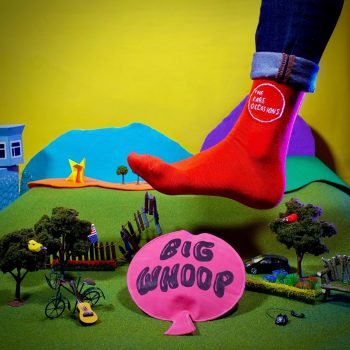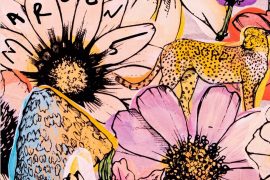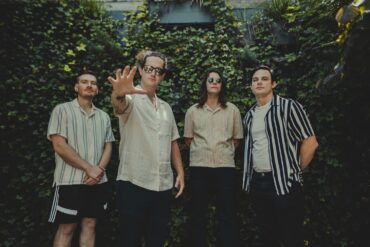Fresh off the viral popularity of their song “Notion,” The Rare Occasions celebrate the anniversary of their cinematic sophomore LP ‘Big Whoop,’ a radiant indie rock record home to their most heartfelt, charged, and inspired songwriting to date.
Stream: “Stay” – The Rare Occasions
This album, it’s kinda all over the place, but that’s just who we are.
Suffice to say, it’s been a whirlwind year for The Rare Occasions.
The Los Angeles by-way-of New England indie rock band has long had that it factor: A rare mix of unbridled energy, unfiltered honesty, and raw passion that lights a fire deep inside. Since forming at a Tufts University practice space in 2012, the band – currently consisting of Brian McLaughlin, Luke Imbusch, and Jeremy Cohen – have consistently pushed themselves and their art, developing a uniquely captivating and charismatic signature sound that blends garage rock with progressive influences. The resulting music often feels like a controlled chaos (and has even been described as such); it’s earnest and explosive, achingly emotive and irresistibly dynamic all at once.
Sure it’s a calming notion, perpetual in motion
But I don’t need the comfort of any lies
For I have seen the ending and there is no ascending rise
Oh, back when I was younger, was told by other youngsters
That my end will be torture beneath the earth
‘Cause I don’t see what they see, when death is staring at me
I see a window, a limit, to live it, or not at all
If you could pull the lever to carry on forever
Would your life even matter anymore?
Sure it’s a calming notion, perpetual in motion
But it’s not what you signed up for
– “Notion,” The Rare Occasions
So when one of their older songs, “Notion,” from 2016’s Futureproof EP, went viral on TikTok late last year, it was more than a welcome surprise; it was about damn time. The Rare Occasions have independently built a steady and ever-expanding following over the course of three EPs (2013’s Applefork, 2014’s Feelers, and 2016’s Futureproof) and two LPs (2018’s Into the Shallows and 2021’s Big Whoop), but nothing quite compares to going “viral” in this era of social media saturation. A decade into their career, the world is finally taking notice of this incredibly talented, longtime Atwood Magazine favorite. “Notion” has since racked up a whopping 215+ million global streams on Spotify alone.
The Rare Occasions were quick to capitalize on their older single’s newfound popularity, re-releasing the original “Notion” and a “cinematic” version through major label Elektra Records. The band also has new music on the way, but seeing as today marks the one-year anniversary of their sophomore album, it felt only fitting to highlight this standout set in The Rare Occasions’ burgeoning catalog.

Independently released June 18, 2021, Big Whoop is a cinematic and seductive rush of radiant indie rock.
The stunning twelve-track collection houses some of the band’s most heartfelt and unapologetic moments of their career, as well as their most memorable and mature songwriting to date: From the tender upheaval of emotion in “Stay” and the fragile, sweeping elegance and evocative storytelling of the orchestral “Sparrow,” to the politically charged messages of “Control” (an unleashed outpouring about the injustices perpetrated in Xinjiang, China) and “The American Way,” The Rare Occasions’ sophomore album is a fully loaded and endlessly enchanting adventure. Further highlights include the stirring melodies and heart-on-sleeve lyricism of “Origami” and the pure, feverish energy coursing through “Bolts” and “Set It Right.”
Truly from the moment opener “Alone” hits the ground running, to the graceful, conclusive exhale in the album’s cinematic finale “The Fold,” Big Whoop keeps listeners engaged, immersed, and inspired. It’s an electrifying album that feels as fresh today as it did a year ago.
Dive into the full record via our interview, and peek inside the songs of Big Whoop as The Rare Occasions take us track-by-track through the music and lyrics of their sophomore LP!
Our motto for this album has been “rock with your socks on.”
— —
:: stream/purchase Big Whoop here ::
Stream: ‘Big Whoop’ – The Rare Occasions
A CONVERSATION WITH THE RARE OCCASIONS

Atwood Magazine: First of all, congratulations on album number two! This is huge. I know it's a long time in the making. Can you share a little about the story behind Big Whoop?
Brian McLaughlin: Yeah. So, the last time we did a full-length album was 2018. It was our first album. We were a four-piece band back then, and we had just done a tour to promote that album around the whole country and were feeling some good momentum off of it. And right after the tour, our guitarist, who’s an amazing guy, we’re still in touch with him. But unfortunately, he had to move back home and leave the band. So we were kind of starting from scratch, like we couldn’t play any of those songs as a three-piece, and so we kind of had this moment where it’s like, “Okay. Are we gonna keep doing this or is this it for The Rare Occasions?”
We all really wanted to keep making music, so we were like, “Okay. Let’s do it.” During that time, we were also playing a lot of open mic type things and like Sofar Sounds, like stripped-down gigs, and I think that was a good moment for us because we were kind of figuring out how we could make it work as a three-piece and stripping down to the essentials. Like, “What is important in a song, and was superfluous to the actual song.” I think we relied a lot on guitar arrangements and fancy stuff like that. And when we stripped it down to the basics, the focus was much more on melody and harmony and then we took it from there. We we were playing a lot of full-band shows after that and really liked the rambunctious live energy feel, and then we kinda took that into this recording process.
Into The Shallows was recorded before or after the kind of disruption and everything?
Brian McLaughlin: That was before. Yeah, we recorded it in 2017, released it in 2018, and then Peter left the band. We kinda had to figure out what we were gonna do. And during that time of figuring out, we basically just like, “Let’s just make music.” So we didn’t have any plan going into it, and we recorded batches of maybe three to four songs at a time. Just songs that we’d thought were… Songs we liked and we just recorded. I think the first one… The first batch we did was Alone, Controls, and Set It Right. Then we just kept recording more and more, and then eventually we’re like, “You know, maybe we could turn this into an album.” And I think it was during the pandemic that we decided, “Yeah, let’s just finish it. Because there’s nothing else we can do right now.”

It sounds like this was a process of rediscovery and figuring out what it meant to be a trio.
Brian McLaughlin: Absolutely, yeah. And it kinda went through a couple phases too, because when we… Before lockdown, we were really charged up on the live show. Like, we’re gonna be the power pop stadium rock kind of band, and just wow people with how loud we are and noisy we are. And then lockdown happened, and then we started listening to what we had recorded up to that point and thinking, “Oh well, we have a lot more to say as musicians. We have a lot more to us.” And Luke, as you know, he’s like a film composer so he’s… He basically just started arranging these orchestral parts for some of the quieter songs that we had written and… Yeah. So there was kind of two phases, and the lockdown phase just, I think, artistically went in a whole different direction and was definitely like a point of growth for us ’cause, yeah… We realized, “Oh, we’re more than just a rock band. Like, we can do a lot of different stuff,” and we enjoyed that stuff too, which was is cool.
You really hear that as you dive deeper into Big Whoop. Especially on some of the songs beyond “Alone,” “Bolts,” and “Control,” you start to take up more space and allow the sounds to find their home.
Brian McLaughlin: For sure, yeah. I think for us, “Stay,” the fourth track, which is right after “Control,” it was kind of the pivot point creatively, because… Yeah, that was a song where all three of us were very involved. And Jeremy basically wrote the main chunk of the song, the guitar part that sets the tone and then we were just messing around with it a lot. I wrote this… The, I don’t know, bridge or the quiet part in the middle, and then Luke came up with the other bridge and also all the orchestral stuff and yeah, it was just… It was cool to see like… We were surprised with ourselves with like what we were capable of, much more dynamic than we thought.
That, to me, was also a pivotal point when I heard “Stay.” I think it's cool that you guys have that kind of self-awareness, that there's a change there. What was your vision going into this record? Did that change over the recording process?
Brian McLaughlin: Oh, yeah. Yeah, absolutely. I think what I had just said about going into it, we didn’t even know it was an album. And we were more into the just heavy rock songs, like bashing our audience over the head with guitars. That was how we envisioned Big Whoop as this big thing, and then once we dove into it a little bit further, we experimented more, had strings, I played keyboards in songs, and so it was like… There WERE almost two phases to the creative process, but I don’t know if the other guys have more to say about that.
Jeremy Cohen: Well, it’s funny ’cause we actually were having that conversation about, “Oh, haha. Big whoop. Like, whoopee cushions. Hahaha.” Like, we were just kind of throwing around ideas for the album name during the film process of “Stay,” which could not quite more be the antithesis of just the phrase, “Big Whoop.” We just had shot a scene where it’s like, there was rain in the music video so we were all cold and tired and we were just like a little loopy at that point. We were just joking about, “What if it was called Big Whoop?” during the film video shoot of probably one of the, if not, the saddest song on the actual record itself.
Brian McLaughlin: It’s got a lot of moods. This album, it’s kinda all over the place, but that’s just who we are.
Jeremy Cohen: Big old palette.
I appreciate that. You just mentioned the album name, Jeremy! Can we talk about that? Why the title Big Whoop?
Jeremy Cohen: I think Big Whoop is just like… It’s just got the word “big” in it, and the word “big,” I think, can very easily describe rock, at least in its roots. I don’t think rock was meant to be a small-minded genre, and so we shrunk by 25% in 2018. I think our confidence dipped double that when we lost our guitar player, trying to figure out what we’re doing next. And then when we came back and just decided like, “Hey, we’re gonna keep doing this.” Like, it just felt cool that we still had more to do. Big Whoop was just maybe less of a description of our sound. It was kind of just more so the idea that, “Hey man, we’re gonna write a rock album.” “Let’s do it.” But then also the phrase “Big Whoop,” where it’s just like…
Luke Imbusch: Big whoop. Are you kidding me?
Jeremy Cohen: Like, “Big whoop. Who cares?” Sometimes you just gotta look at life and say, “Big whoop.” [chuckle]
Brian McLaughlin: Yeah, I think it’s like we felt like with Into The Shallows, we were trying to be this super serious indie-darling-type band, and that’s just not us. We just wanted to have fun with music. It’s like, ‘Why take it so seriously? Big whoop, it’s just music, it’s supposed to be fun!’ I think that’s the vibe we’re trying to go for with this one.
Thematically, how do you feel Big Whoop distinguishes itself from Into The Shallows?
Brian McLaughlin: I think, it overall just has a lot of heart. Each individual song can stand on its own, and because we didn’t know it was going to be an album going into it, it almost has that feel of an album of singles. So that’s for better, for worse, that’s kind of how it is. And I think it’s just much more focused on the songs themselves. We could play this album acoustic, and it would still get all the ideas across and be really fun to listen to, I think, whereas Into The Shallows was more of a rock… Well, it was just more dependent on the arrangements.

I feel like as a band, you guys went from the bedroom engineering studio, where I know the first couple of EPs originated, to discovering your live sound and really just saying, “Hey, we're more than just a project” with your debut, and now you’ve found a balance between those two with the second album.
Brian McLaughlin: Yeah, for sure. There’s still the homemade aspect of it. Like, we recorded it all here basically, but it was influenced by the outside world, which is ever more dear in these times.
As a lyrically forward songwriter, Brian, do you have any favorite lyrics in these songs?
Brian McLaughlin: It’s tough for me to say. I think from a songwriting point of view, it’s not a hit single type song, but I think “Sparrow” is my strongest work so far. In terms of chords and melody, it’s just more interesting than what we’ve done before, and I think the lyrics tell a story and paint a picture in a nice way. I don’t know, I feel pretty happy with “Sparrow.”
I close my eyes, and I drift into another life
One where I’m only the sparrow in the window
My wings flutter fast, and I see myself inside the glass
Pacing and pondering how we fell from happy
My love, she turns a shoulder
Scrolls the web with her eyes glazed over
And I have seen it all, I’ve seen it all, I’ve seen it all
I fall to the ground
Feel this darkness pull me down
And crash in a harrowing plume of smoke and feathers
She wanders over to piece me back together
You also got political on “The American Way” – that, and “Do Not Do Drugs” are very interesting.
Brian McLaughlin: “The American Way,” actually, I’m pretty happy with how the lyrics turned out. I wanted to be very careful about what I was saying and every single word that’s on there, is what we meant to say. It’s important to say, it’s not meant to be anti-American or anything like that. Basically, I work at a large corporation, I’ve been part of corporate America for a few years now and something that has rubbed me the wrong way is this idea of risk-taking being worshipped as this thing. Like take big risks get big rewards. And I think what many American corporations fail to factor into their risk calculations is that the general public can be a victim to some of the decisions that they make and… You look at the opioid epidemic where people were trying to sell prescription drugs as quickly and as much as they could during the ’90s and now you have tens of thousands of people dying every year of opioid overdoses. We also have things like the 737 Max that Boeing tried to take a shortcut and use an old frame for their airplane and just use a different engine and hopefully we’ll fix it in software and it’ll be fine, and we have two plane crashes that kill hundreds of people. And I just wanted to make the point that we need to hold these private entities to account. As American citizens we’re responsible for ourselves and our people and if people are being killed by sort of reckless decisions in my mind, we need to stop that.
I appreciate that. You've grown more socially conscious in your lyrics over the years, and I think it's nice that you guys are able to weave that into your songs when the time calls for it. Aside from these tracks, do you have any personal favorites or highlights off the album?
Luke Imbusch: My favorites are the ones I got to experiment with more, with orchestral elements. I got to use some of my other musical skills that I don’t usually get to use with this band and part of that was maybe just having… Being a three piece and maybe having less cooks in the kitchen and also just having more time in the pandemic to focus on our creativity and just experiment more. So I think I feel really proud of “Stay,” and “Sparrow,” and “The Fold” because those really highlight the orchestral elements, the strings that we recorded in Brian’s living room. So yeah.
Brian McLaughlin: I think “Origami” is probably the highlight for me. From a mix mixed point of view, I think we knocked it out of the park. Jeremy had this idea of damping the snare with a T-shirt and the snare tone is just… I love it for that song. And yeah it’s just like a cool vibe. But yeah I like “Sparrow,” I like all the experimental tracks as well.
Jeremy Cohen: Yeah. I would highlight for me personally “The Fold” just ’cause when we were talking about it we were like, “Alright, we don’t wanna just write another 68, Doo-Wop-y ’90s rock ballad or anything like that that just swings and sways. We gotta make this one count.” Luke’s orchestral arrangements just perfectly complement Brian’s… The explosion of the song is really just powerful. You really have to hear it for yourself. I’m really stoked on that ’cause we didn’t take the easy way out with that song. It’s really simple but making it sound like that was not. So I think it was just exercising restraint was the real technique there to give room for some of Luke’s magic.
We wrote it two years ago at this point but, for me, it’s gonna be an all-time favorite, is “Control.” Compositionally it grows to this big whoop at the end, and the message is super relevant, unfortunately, but we’re culling stuff out, which is good. It’s just loud, man.
Luke Imbusch: It’s fun to play. I would agree with you guys. It’s really fun to play.
Brian McLaughlin: Yeah, it’s probably the most fun song to play.
Luke, everybody is talking about your magic. You've really taken a headfirst dive into orchestrating! Correct me if I'm wrong, that's part of what you studied as well, right?
Luke Imbusch: Yeah, yeah, I studied film scoring so. Writing music to tell stories with film and TVs is kind of what I do.
Can you tell me a little bit about your experience scoring this album and what some of your goals were in terms of adding to the three of you?
Luke Imbusch: Well, we had done a little bit of this, going back all the way to the Futureproof EP. The beginning of our song, “Notion,” has a little orchestral intro that everyone thinks is sampled, but is actually… We made that from scratch. [chuckle] So, I think it has been in the back of my mind wanting to do more of that with our music and just never really finding the right opportunity to do it until we had time to get rid of some of the distractions and just see how we could make our music more dynamic. And this was a good opportunity, because we were redefining our sound, and Brian had written some really cool songs that just, especially “Sparrow,” I think was the first one we really dove in on. And I just fell in love with the chords and the melody like he was talking about, and we just let our imaginations run wild with some of the arrangements and… So it was fun. We just took our time with it, we didn’t really have a goal, we were just seeing where it went, and this is the product.
That's awesome! What do you guys hope listeners take away from Big Whoop, and what have you taken away from creating it and now putting it out?
Brian McLaughlin: I hope they have fun listening to it, that’s number one, and maybe they learn something from it, a little bit of introspection and maybe appreciation for some of the more nuanced musical elements as well.
Luke Imbusch: My goal is for people to listen to it in their bedrooms and with their socks, and just dance in their socks. Not only their socks! [laughter]
Brian McLaughlin: Our motto for this album has been “rock with your socks on.”
Luke Imbusch: Rock with your socks on is the slogan, so we just want the people to take their shoes off and dance around their living room until we’re able to be in a room again and play at a venue and rock out with everybody.
Jeremy Cohen: I hope listening to this album helps people get to work quicker. If it can increase their heart rate, then that’s a good thing. Either dynamically or emotionally, I think that there’s something for everyone.

— —
:: Inside Big Whoop ::

— —
Alone
This is the first song we wrote after becoming a three-piece and it felt like the right way to kick off the album. The lyrics poke fun at the absurdity of “millennials are destroying this, millennials are destroying that” type thinkpieces.
Bolts
For a lot of people, maintaining sanity during lockdown meant developing some new obsession (or rekindling an old one), and for me that was skateboarding. Practicing flatground tricks every day kept me happy and rooted in reality. I was also thinking about how “Catch a Wave” by The Beach Boys is such a funny and wholesome ode to surfing, and I wanted to do something like that for skateboarding.
Control
This song is meant to shed light on the genocide in Xinjiang, where more than one million Uygur people have been detained without cause. The song builds slowly until it boils over completely towards the end.
Stay
One day at practice, Jeremy showed us this beautiful 7/4 guitar riff and it eventually became this huge electronic, orchestral ballad – a mess of emotions which will make you wonder whether you should dance or cry. It’s the first of five songs on this record where Luke arranged and conducted a live string quartet.
Origami
Big Whoop has a lot of very loud and very quiet songs, and when we wrote this track, we were only setting out to create something in-between to bridge it all together, but Origami turned out to be the highlight of the album for us and perhaps a sonic direction we will take in the future.
Sparrow
This song is a bit surrealist, with a bird appearing in the window, but suddenly you are the bird looking in at yourself through the window. The melody and chords and string arrangement are completely different from what you might expect from an “indie band”; it’s definitely a track that we think is pretty special.
Call Me When You Get There
A ‘70s stadium rock song about driving to pick someone up at the airport after a long trip. We originally wrote this song (along with Set It Right) during a string of small acoustic style gigs, and stripping away the instrumentation helped us figure out the core of our sound for this record: loads of three-part harmonies and a focus on melody above all else.
The American Way
Corporate America has a culture of worshiping risk. Take big risks, get big rewards. It’s all well and good except for the fact that decade after decade, these decisions cause massive harm to the public. The opioid epidemic, the 737-MAX crashes, the housing bubble, continued mass shootings – it’s innocent people that always end up paying the consequences for some executive’s calculated risk-taking adventure.
Do Not Do Drugs
This is a song about not doing drugs.
Cynical
This is sort of a motivational song about how things aren’t always as bad as they seem, or how a situation can often turn around for the better; life isn’t static. This was the last song we finished and we actually re-wrote and re-recorded the bridge because the initial version was no bueno – a perfect example of things turning around for the better.
Set It Right
A simple song about trying to be a good person who is kind to others, complete with loud guitars, vocal harmonies, and an obscure reference to local Rhode Island philanthropist Alan Shawn Feinstein (a lyrical rite of passage for every Rhode Island band).
The Fold
This piano ballad that ends the album focuses on the idea of returning home, and how that place can be different from the place you remembered from before. Luke’s string arrangement really pulls it all together, and the vocal is probably the most emotive and dynamic I’ve attempted to be on a record.
— —
:: stream/purchase Big Whoop here ::
Stream: ‘Big Whoop’ – The Rare Occasions
— — — —

Connect to The Rare Occasions on
Facebook, Twitter, Instagram
Discover new music on Atwood Magazine
? © Kenneth Bauer
:: Stream The Rare Occasions ::








